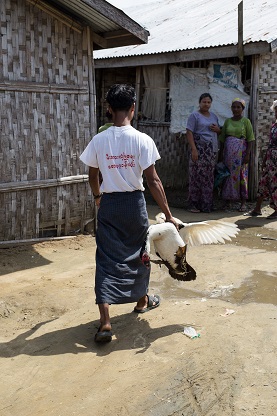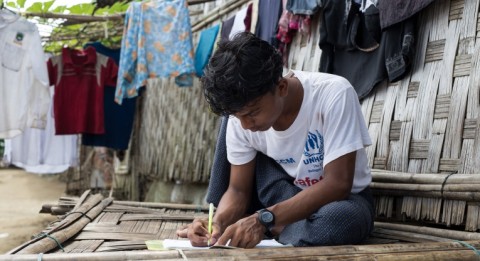A ray of sunshine in an IDP camp – 17-year-old Hla Tin in school for the first time in his life
The erupted violence between Muslims and Buddhists forced Hla Tin’s family to leave their home. Life in temporary camps is hard without meaningful activities. Hla Tin is now attending non-formal education classes for two hours a day and dreaming of a future profession.
For a very long time there have been tangible tensions in the state of Rakhine in Myanmar. Approximately 140 000 people were forced to leave their homes when the ethnic tensions burst into fully-fledged violence. Now the displaced people are living in camps; Muslims among Muslims and Buddhists among Buddhists. The troubled situation has lasted for almost two years.
In addition to losing his home, Hla Tin, 17, lost his job as well. When his family was still living at home in Jaukpur, a town close to Sittwe, he worked as a helper in his father’s fishing business.
There aren’t many livehood options in the camp they’re living in now. And his father isn’t well.
“Everything was different at home. Even if I didn’t have a job at home, I could go to the fishing boats and ask for one. Then I’d get some money. I can’t get a job here in the camp, because I’m not educated”, Hla Tin says.
“Many are in the same situation at the camp. Most of them are unemployed. If we need medication, we sell part of our food provisions.”
Medicine is sold at the camp pharmacy. There is no doctor available.
Teachers love their students

After a school day, Hla Tin gathers the family’s ducks which have fled their backyard. By raising ducks, the family can gain extra income with which to buy medicine or food supplies at the camp’s market.
Last spring, a big change happened in Hla Tin’s life full of frustration and idle time.
With the help of Finn Church Aid, temporary schools made out of bamboo were constructed, teachers were trained, pupils were selected and they received school materials. For the very first time in his life, Hla Tin got a chance to attend a school class.
“Writing words was very difficult at first. I was actually a little depressed of how difficult it was and when I couldn’t write everything. But the teacher encouraged me and said no-one can learn everything in a day. I just had to practice more.”
The non-formal education class has pupils of different ages and of different skill levels. On the average, they are between 13 and 17 years. Youth, who never had the chance to attend school before. Here, they have the opportunity to learn how to read, write and calculate. Skills which will surely come useful later in life.
In each class, there are two teachers. They also have time to guide each student personally when needed.
Hla Thin says that the teachers in his class are good and take care of the students constantly. The teachers also help out with the exercises.
“Teachers love us. They are like my own family.”
Extra income from family of ducks
School day lasts two hours. The classes are from 10 a.m. to the mid-day on weekdays. After the classes, Hla Tin goes home and feeds the family’s ducks. Sometimes they have wondered off and he has to find them for a feeding, otherwise they don’t have energy to lay eggs.
At first, Hla Tin’s family had three ducks which cost about 16 euros. Then eight little ducklings were born, of which five were sold. The extra income came in need.
After the feeding, Hla Tin eats lunch that his mother and sister have prepared.
”After lunch, I go to a mosque. After that I see my friends. Sometimes we play football”, Hla Tin says.
Work in a freighter
Life was much emptier and frustrating before school. Hla Tin didn’t really have any friends or anyone he could talk to.
“I’ve made a lot of friends at school and I can talk about everything with them.”
Still, Hla Tin would like to return home. Working and making money would be a lot easier there.

If it’s not raining, homework can be done for example outdoors. There’s no electricity at camp’s homes.
“I could do a lot of fishing. A lot of foreign freighters come to the port and the sailors buy fish. I have always been curious of what happens in those big ships.”
Getting a proper education will unquestionably become useful in the future. What happens is someone buys 500 fish and the seller don’t know how to count? “When you’re educated, you can choose any job you like. In the future I would like to work in a freighter. Sometimes I’m scared that my education is not enough for that.”
Rakhine state in Myanmar has long suffered from ethnic tensions between different ethnic groups in the region. There are approximately 140 000 internally displaced people (IDP) in the region. Dividing the groups bluntly; between Muslims and Buddhists. Lutheran World Federation implements Finn Church Aid’ Education in Emergencies – programme which is funded by ECHO. The primary schooling of children and youth of both communities are being supported at their IDP camps.
Text and photos: Eeva Suhonen
